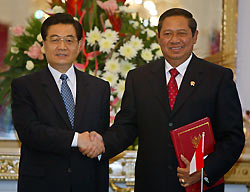|
Indonesia now a strategic partner
By Qin Jize (China Daily)
Updated: 2005-04-25 23:52
JAKARTA: China and Indonesia - the largest country in Southeast Asia - signed a
joint declaration for a "strategic partnership" yesterday, signalling a new
determination on both sides to further consolidate bilateral ties.
 |
| President Hu Jintao (L) and Indonesia's President Susilo Bambang
Yudhoyono shake hands after they sign agreements establishing a "strategic
partnership" between the two Asian countries at the presidential palace in
Jakarta April 25, 2005. [Reuters] |
At a meeting in the Presidential Palace in Jakarta, visiting President Hu
Jintao and Indonesian President Susilo Bambang Yudhoyono also witnessed the
signing of another eight accords aimed at advancing Sino-Indonesian partnership.
Visa exemption for diplomatic and service visits, maritime co-operation,
infrastructure and natural resources, economic and technological assistance,
finance, preferential buyer's credit, and earthquake and tsunami-relief are the
main contents of the eight agreements.
Hu is currently spending two days in Indonesia on a state visit after
attending the Asian-African Summit and celebrating the 50th anniversary of the
Bandung Conference.
He will fly to the Philippines later today, the last leg of his tour of three
Southeast Asian nations, including Brunei.
Fruitful talks
"This is a fruitful meeting," he said later in a joint press briefing, "the
joint declaration not only marks a new stage in the China-Indonesia
relationship, but also will exert a positive influence on the development of
China-ASEAN ties and the solidarity and co-operation among Asian and African
countries."
The two sides agreed to expand trade co-operation, aimed at increasing the
annual bilateral trade volume to US$20 billion within three years, said Hu.
Last year bilateral trade reached US$13.48 billion, up 31 per cent on the
previous year.
Co-operation in areas of infrastructure construction, energy and resource
exploitation, agriculture and fishing are also to be enhanced, he added.
China, said Hu, will provide 30 million yuan (US$3.63 million) worth of
assistance to Indonesia, and another US$300 million in preferential loans for
infrastructure construction and the reconstruction of its disaster-hit areas.
Previously it had pledged US$400 million worth of preferential loans to
Indonesia.
In addition, the Chinese Government has decided to provide another US$2
million worth of rescue relief, including US$1.5 million in cash, to the
earthquake-hit areas.
The relief aid was carried to Indonesia aboard Hu's special plane.
Shortly after last month's massive earthquake hit Indonesia, the Chinese
Government offered US$500,000 cash and the Red Cross Society of China provided
US$300,000 in cash to the relief effort.
President Hu also suggested developing the Sino-Indonesian strategic
partnership by focusing on seven aspects: Strategic consultation, economic
co-operation, security consultation mechanism, anti-disaster co-operation,
social exchanges, China-ASEAN ties and solidarity and co-operation among
developing countries.
The Indonesian president expressed his appreciation of the assistance offered
by the Chinese Government and hailed the seven proposals, saying Hu's visit to
Indonesia was a "milestone" in bilateral relations.
He said Indonesia welcomes China playing an active role in Asian and
international affairs and the establishment of a strategic partnership would
expand the fields of friendly co-operation between the two countries.
Susilo also accepted Hu's invitation to visit China in the latter half of the
year and the two sides agreed to establish a vice-premier level dialogue
mechanism as a way to strengthen strategic consultations.
The two sides also decided to open consulate-general offices in Shanghai and
Surabaya respectively.
Mulia Nasution, director general of the Treasury of the Indonesian Ministry
of Finance, said the preferential loan from the Chinese Government was "a
concrete step in terms of financial co-operation."
As an example of financial co-operation, he said, China Development Bank, a
State policy bank, is planning to be involved in a palm oil plantation project
in Indonesia.
"If it works, the business is expected to expand to the capacity of US$500
million by the end of this year."
In addition to governmental co-operation, he would like to encourage more
business-to-business co-operation.
In terms of tsunami-relief work, the Red Cross Society of China is planning
to build a Friendship Village for 300 families in devastated Aceh in the north
of Sumatra.
"The project will cost US$3.4 million and the village will have public
facilities including schools and clinics," said Jiang Yiman, vice-president of
the society.
Chen Jianmin, head of the China Seismological Bureau also expressed the hope
that a long-term co-operative mechanism in the field will be established after
the signing of the agreement.
(China Daily 04/26/2005 page1)
| |
 |
|
 |
|
|
Today's
Top News |
|
|
|
Top China
News |
 |
|
 |
|
|
|
|
|
|


